Data Managerment Analyst Resume Examples

Jul 18, 2024
|
12 min read
Nail your data management analyst resume: transform your skills into a well-structured career narrative that unlocks job opportunities. Make sure your data tells a compelling story!
Rated by 348 people
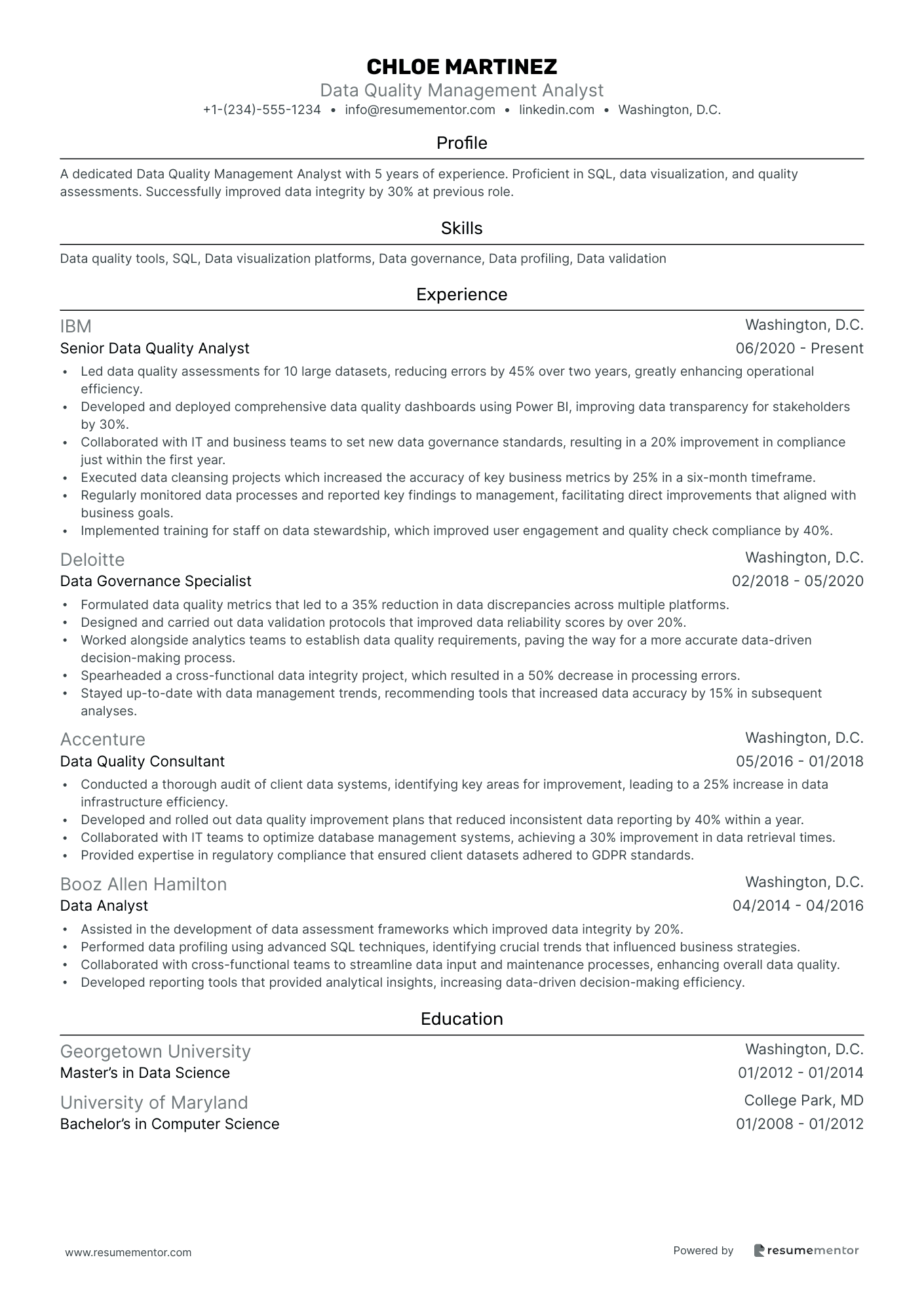
Data Quality Management Analyst
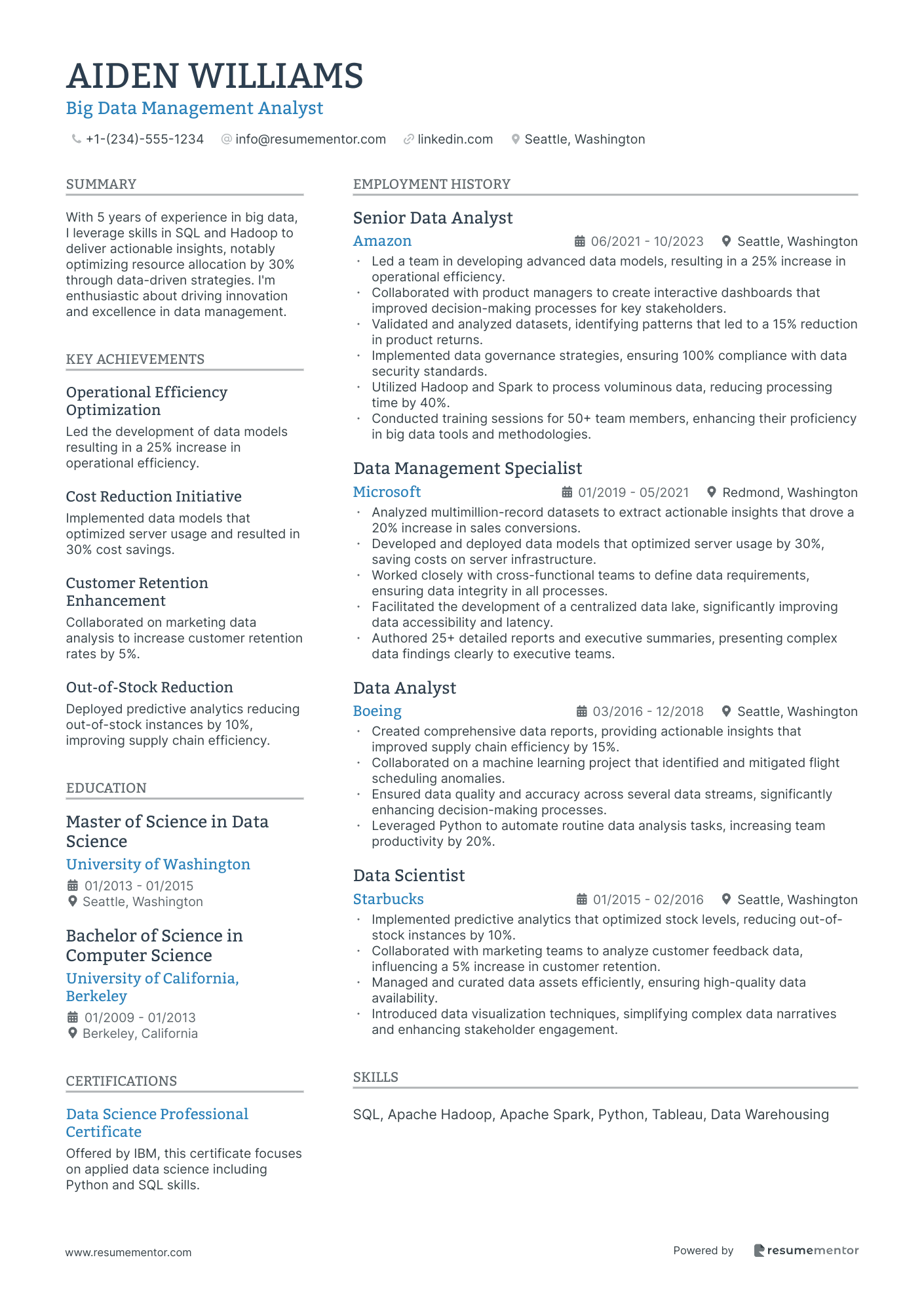
Big Data Management Analyst
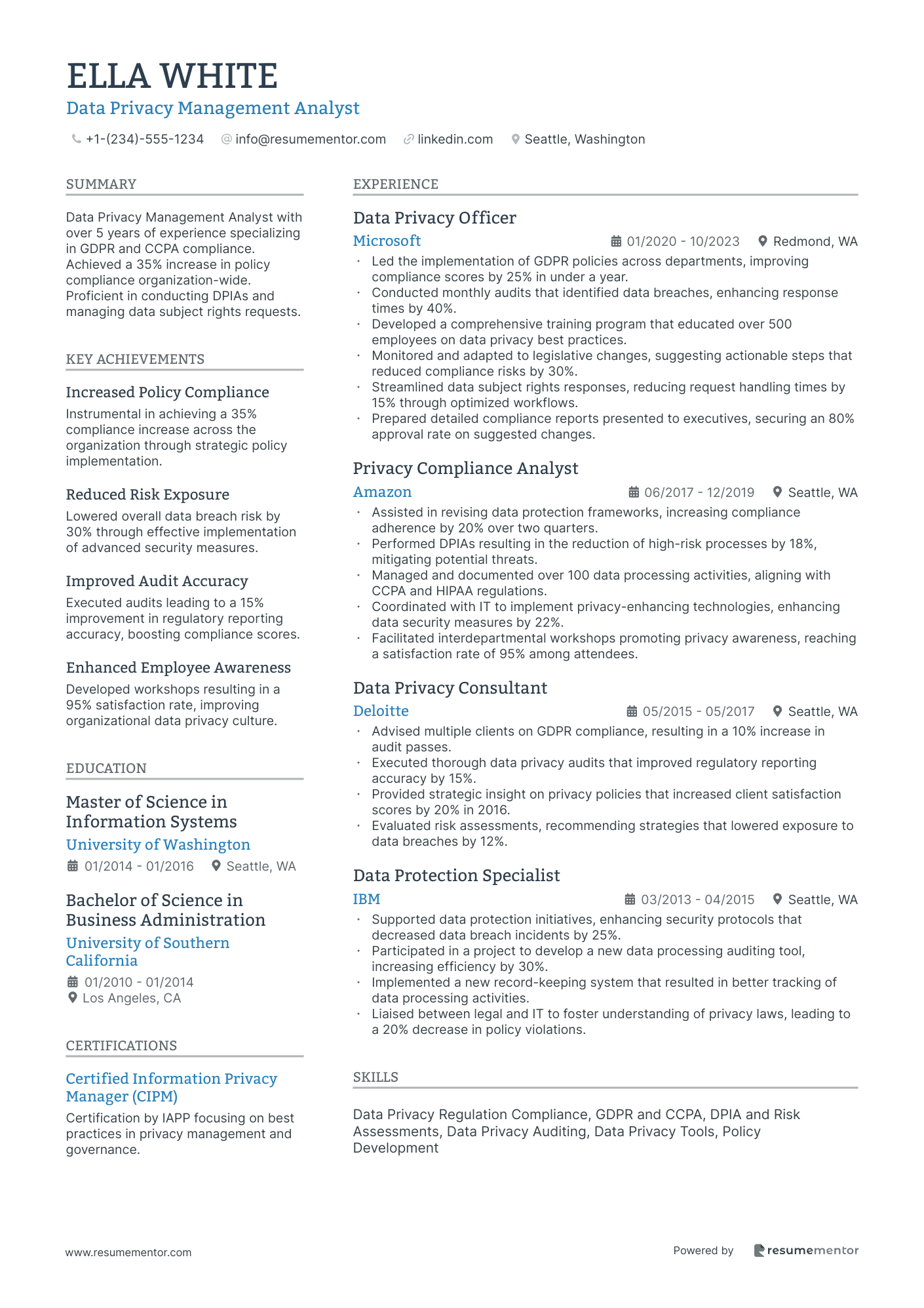
Data Privacy Management Analyst
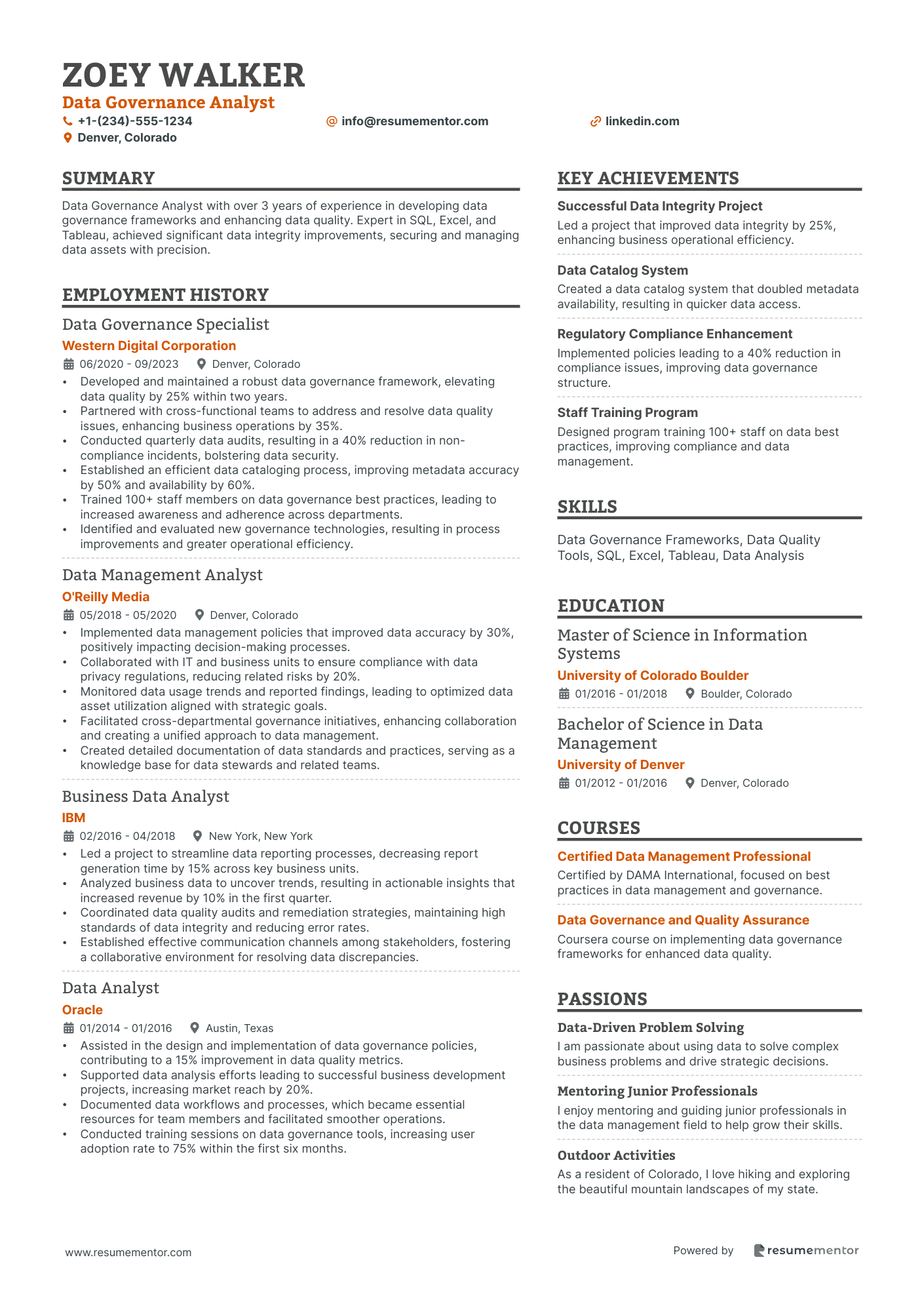
Data Governance Analyst
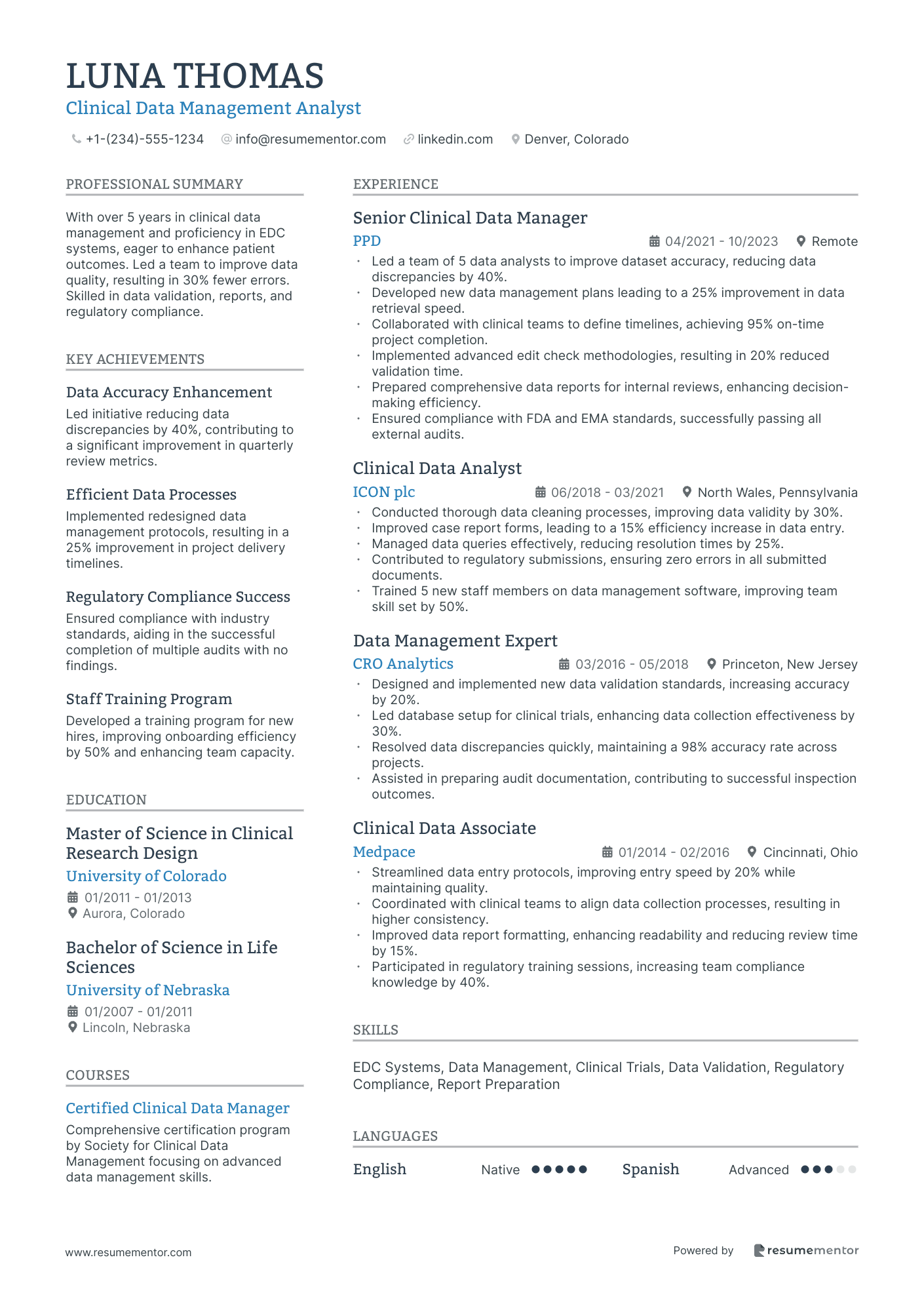
Clinical Data Management Analyst
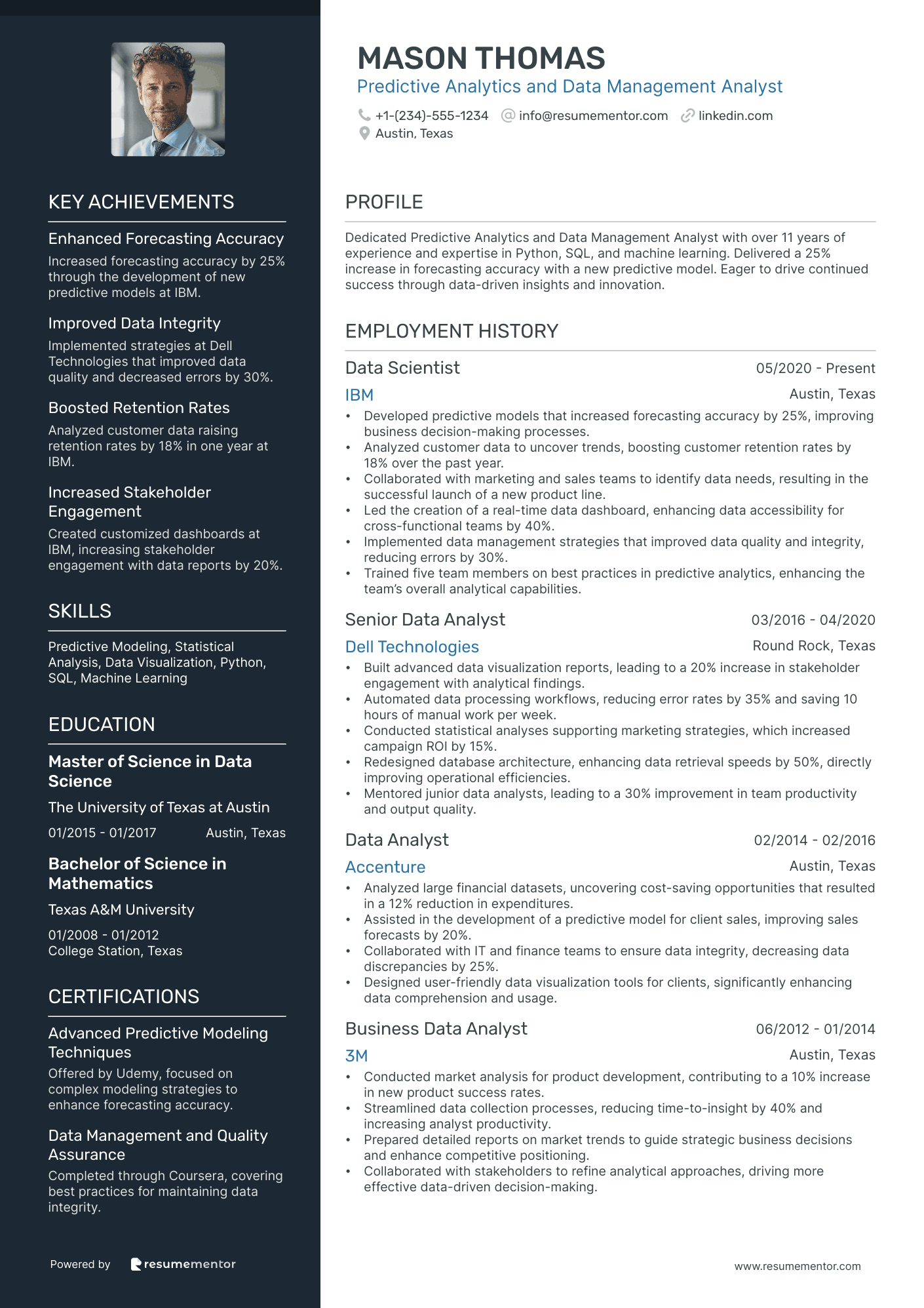
Predictive Analytics and Data Management Analyst
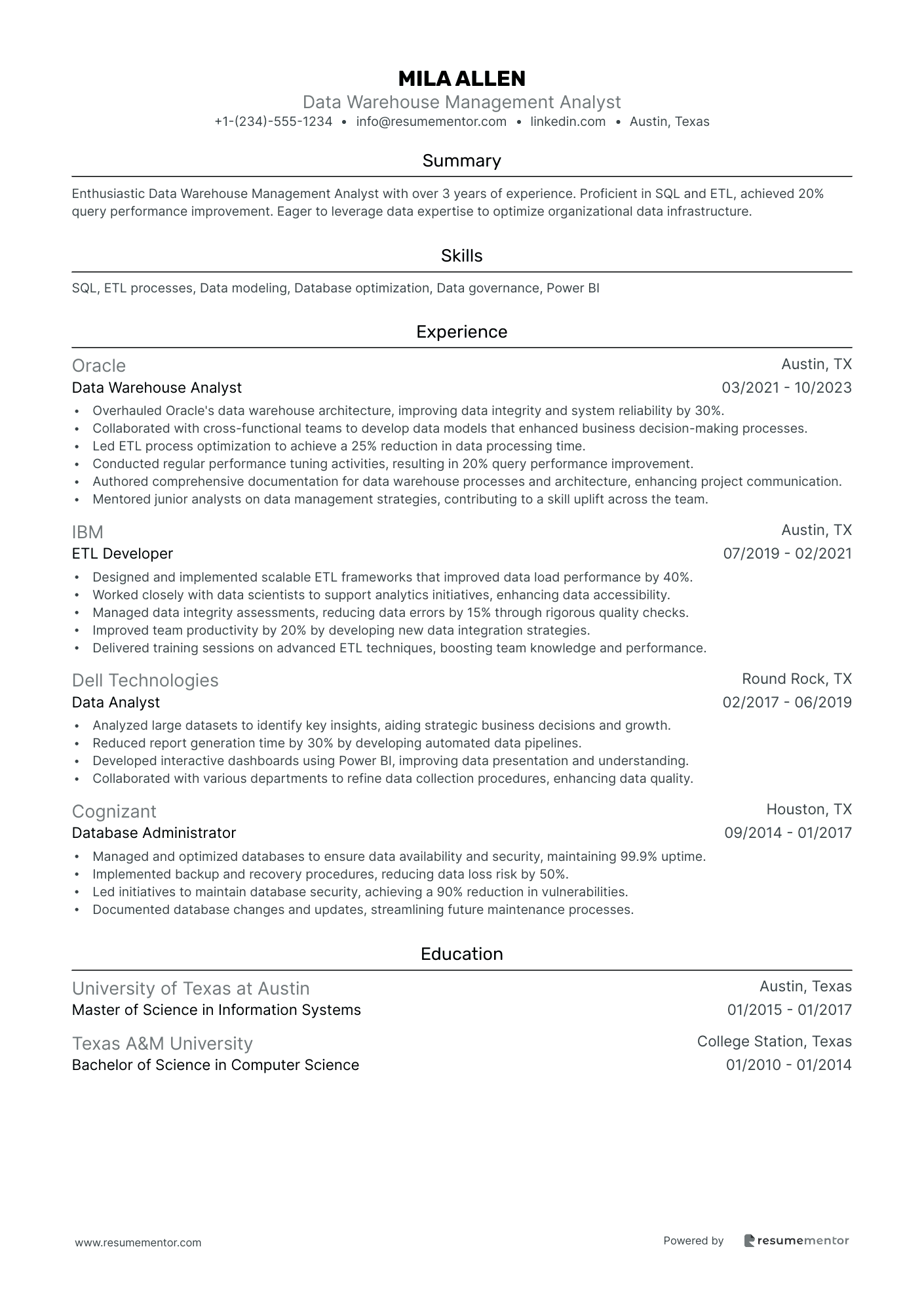
Data Warehouse Management Analyst
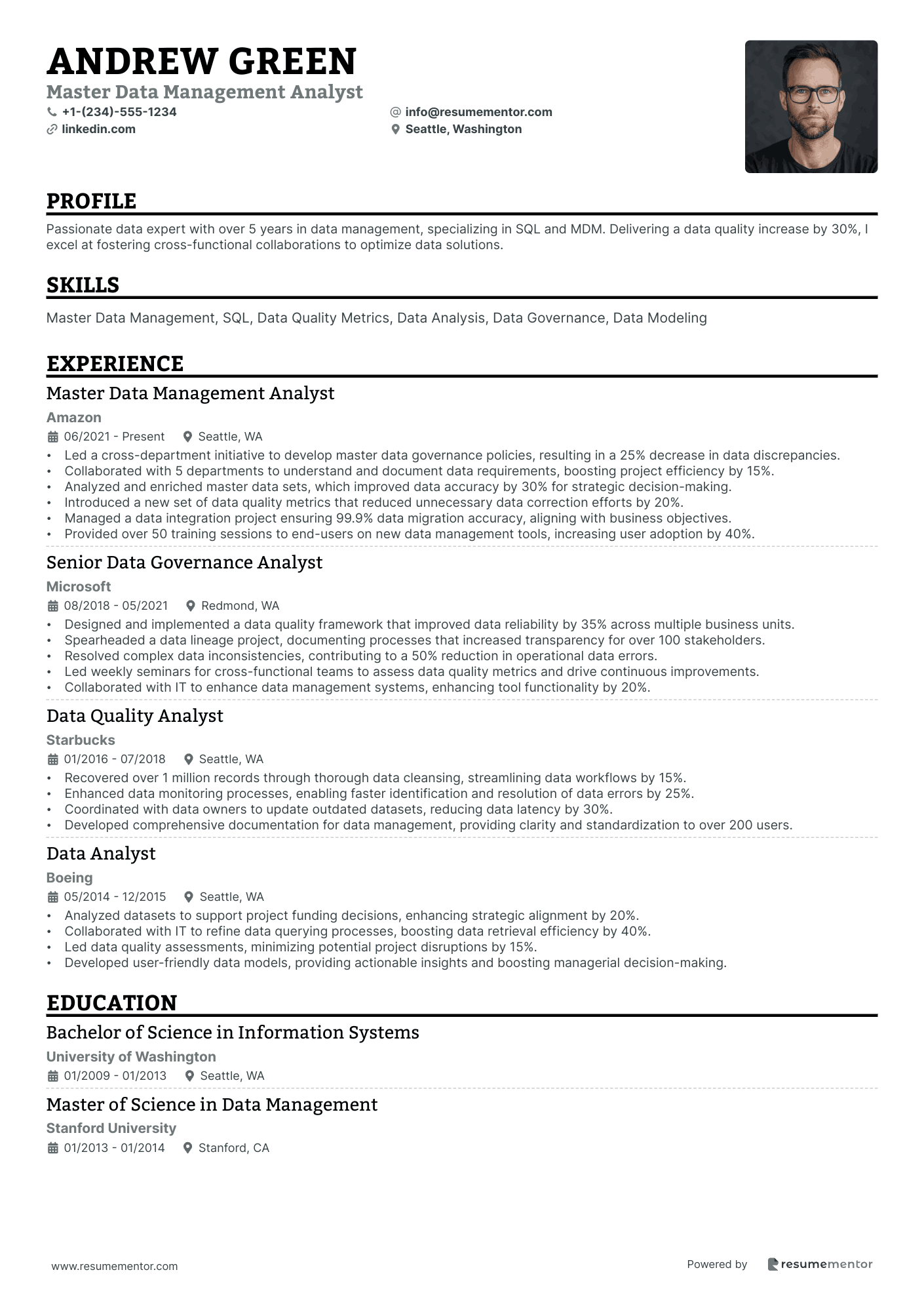
Master Data Management Analyst
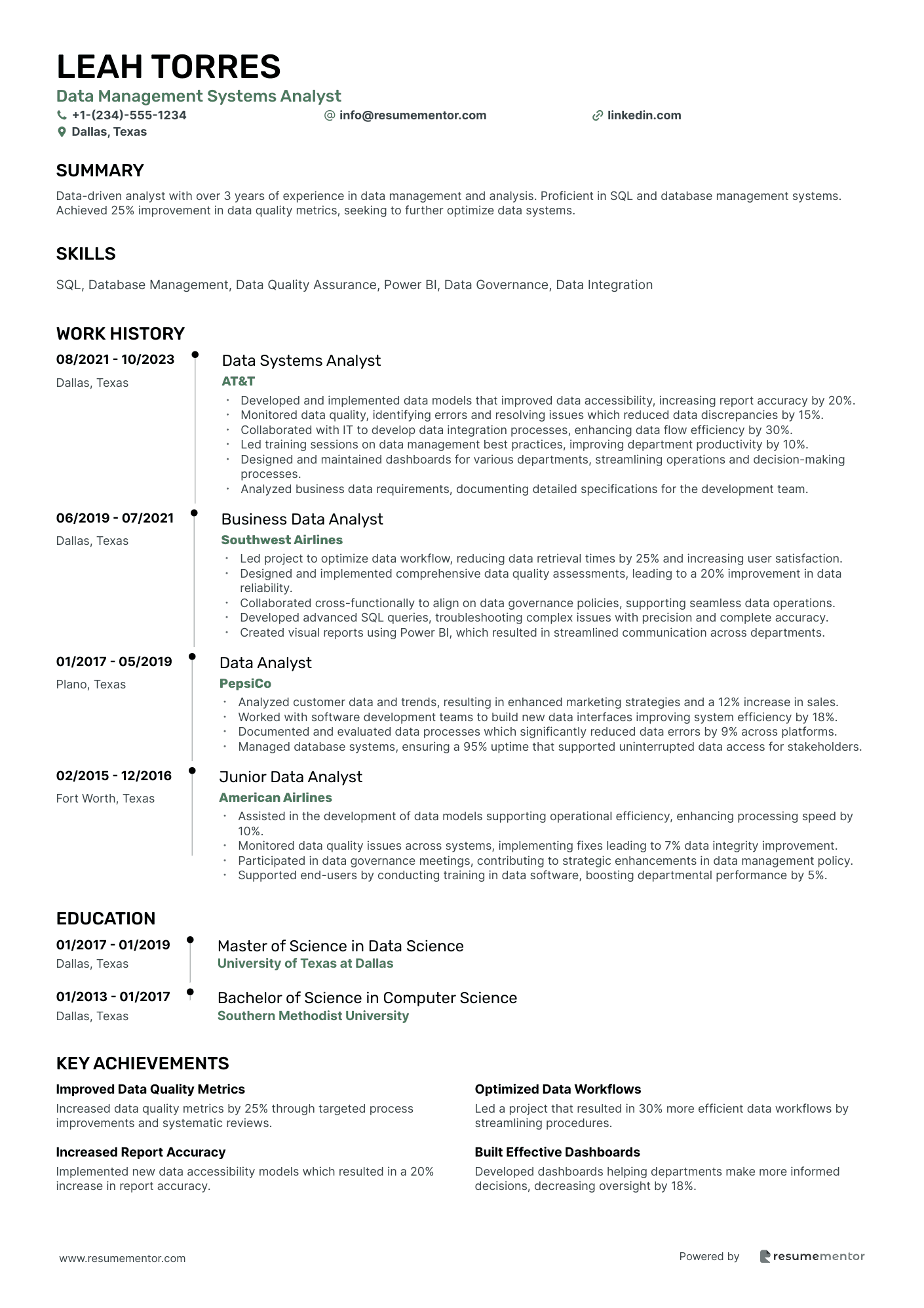
Data Management Systems Analyst
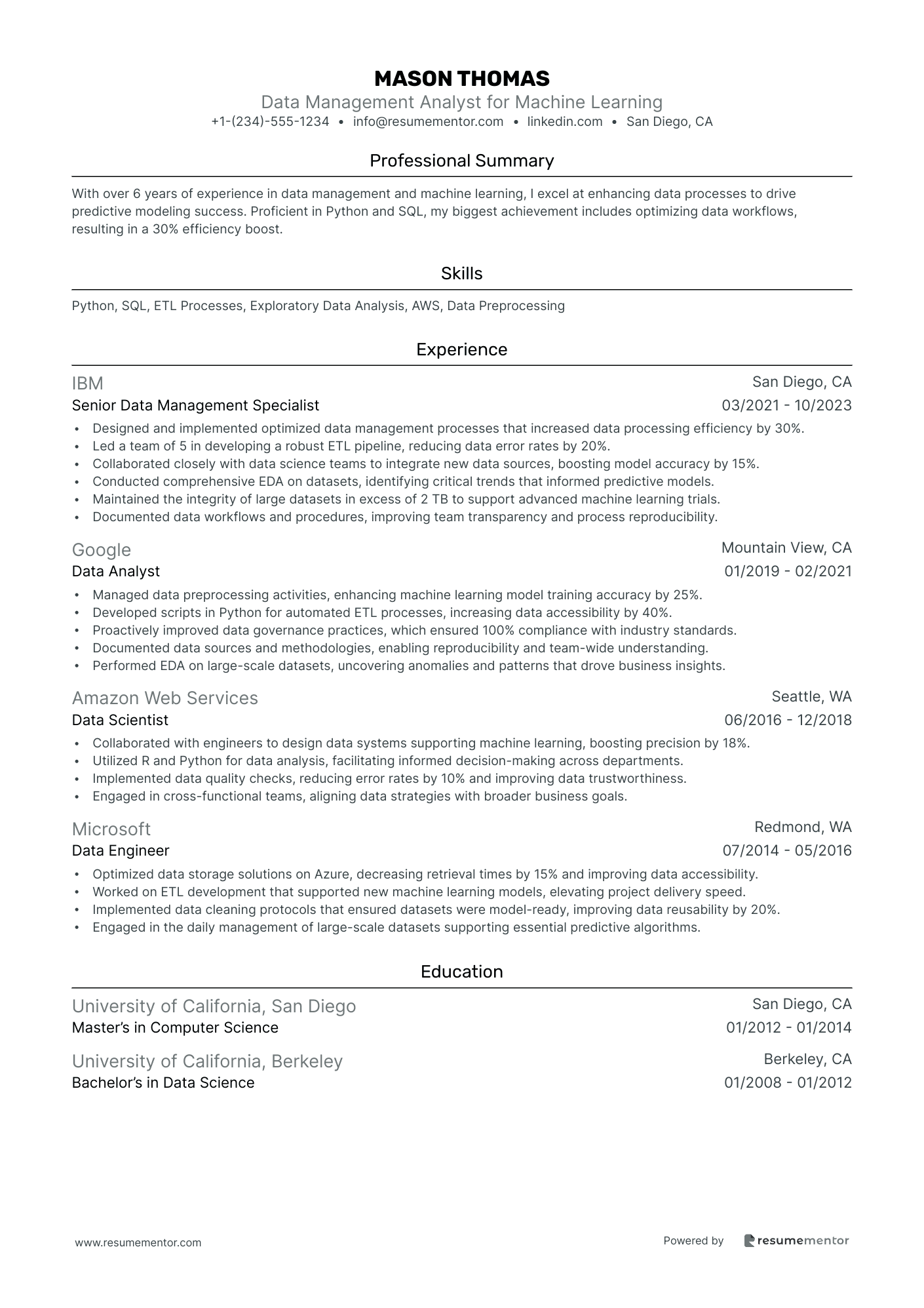
Data Management Analyst for Machine Learning

Data Quality Management Analyst resume sample
- •Led data quality assessments for 10 large datasets, reducing errors by 45% over two years, greatly enhancing operational efficiency.
- •Developed and deployed comprehensive data quality dashboards using Power BI, improving data transparency for stakeholders by 30%.
- •Collaborated with IT and business teams to set new data governance standards, resulting in a 20% improvement in compliance just within the first year.
- •Executed data cleansing projects which increased the accuracy of key business metrics by 25% in a six-month timeframe.
- •Regularly monitored data processes and reported key findings to management, facilitating direct improvements that aligned with business goals.
- •Implemented training for staff on data stewardship, which improved user engagement and quality check compliance by 40%.
- •Formulated data quality metrics that led to a 35% reduction in data discrepancies across multiple platforms.
- •Designed and carried out data validation protocols that improved data reliability scores by over 20%.
- •Worked alongside analytics teams to establish data quality requirements, paving the way for a more accurate data-driven decision-making process.
- •Spearheaded a cross-functional data integrity project, which resulted in a 50% decrease in processing errors.
- •Stayed up-to-date with data management trends, recommending tools that increased data accuracy by 15% in subsequent analyses.
- •Conducted a thorough audit of client data systems, identifying key areas for improvement, leading to a 25% increase in data infrastructure efficiency.
- •Developed and rolled out data quality improvement plans that reduced inconsistent data reporting by 40% within a year.
- •Collaborated with IT teams to optimize database management systems, achieving a 30% improvement in data retrieval times.
- •Provided expertise in regulatory compliance that ensured client datasets adhered to GDPR standards.
- •Assisted in the development of data assessment frameworks which improved data integrity by 20%.
- •Performed data profiling using advanced SQL techniques, identifying crucial trends that influenced business strategies.
- •Collaborated with cross-functional teams to streamline data input and maintenance processes, enhancing overall data quality.
- •Developed reporting tools that provided analytical insights, increasing data-driven decision-making efficiency.
Big Data Management Analyst resume sample
- •Led a team in developing advanced data models, resulting in a 25% increase in operational efficiency.
- •Collaborated with product managers to create interactive dashboards that improved decision-making processes for key stakeholders.
- •Validated and analyzed datasets, identifying patterns that led to a 15% reduction in product returns.
- •Implemented data governance strategies, ensuring 100% compliance with data security standards.
- •Utilized Hadoop and Spark to process voluminous data, reducing processing time by 40%.
- •Conducted training sessions for 50+ team members, enhancing their proficiency in big data tools and methodologies.
- •Analyzed multimillion-record datasets to extract actionable insights that drove a 20% increase in sales conversions.
- •Developed and deployed data models that optimized server usage by 30%, saving costs on server infrastructure.
- •Worked closely with cross-functional teams to define data requirements, ensuring data integrity in all processes.
- •Facilitated the development of a centralized data lake, significantly improving data accessibility and latency.
- •Authored 25+ detailed reports and executive summaries, presenting complex data findings clearly to executive teams.
- •Created comprehensive data reports, providing actionable insights that improved supply chain efficiency by 15%.
- •Collaborated on a machine learning project that identified and mitigated flight scheduling anomalies.
- •Ensured data quality and accuracy across several data streams, significantly enhancing decision-making processes.
- •Leveraged Python to automate routine data analysis tasks, increasing team productivity by 20%.
- •Implemented predictive analytics that optimized stock levels, reducing out-of-stock instances by 10%.
- •Collaborated with marketing teams to analyze customer feedback data, influencing a 5% increase in customer retention.
- •Managed and curated data assets efficiently, ensuring high-quality data availability.
- •Introduced data visualization techniques, simplifying complex data narratives and enhancing stakeholder engagement.
Data Privacy Management Analyst resume sample
- •Led the implementation of GDPR policies across departments, improving compliance scores by 25% in under a year.
- •Conducted monthly audits that identified data breaches, enhancing response times by 40%.
- •Developed a comprehensive training program that educated over 500 employees on data privacy best practices.
- •Monitored and adapted to legislative changes, suggesting actionable steps that reduced compliance risks by 30%.
- •Streamlined data subject rights responses, reducing request handling times by 15% through optimized workflows.
- •Prepared detailed compliance reports presented to executives, securing an 80% approval rate on suggested changes.
- •Assisted in revising data protection frameworks, increasing compliance adherence by 20% over two quarters.
- •Performed DPIAs resulting in the reduction of high-risk processes by 18%, mitigating potential threats.
- •Managed and documented over 100 data processing activities, aligning with CCPA and HIPAA regulations.
- •Coordinated with IT to implement privacy-enhancing technologies, enhancing data security measures by 22%.
- •Facilitated interdepartmental workshops promoting privacy awareness, reaching a satisfaction rate of 95% among attendees.
- •Advised multiple clients on GDPR compliance, resulting in a 10% increase in audit passes.
- •Executed thorough data privacy audits that improved regulatory reporting accuracy by 15%.
- •Provided strategic insight on privacy policies that increased client satisfaction scores by 20% in 2016.
- •Evaluated risk assessments, recommending strategies that lowered exposure to data breaches by 12%.
- •Supported data protection initiatives, enhancing security protocols that decreased data breach incidents by 25%.
- •Participated in a project to develop a new data processing auditing tool, increasing efficiency by 30%.
- •Implemented a new record-keeping system that resulted in better tracking of data processing activities.
- •Liaised between legal and IT to foster understanding of privacy laws, leading to a 20% decrease in policy violations.
Data Governance Analyst resume sample
- •Developed and maintained a robust data governance framework, elevating data quality by 25% within two years.
- •Partnered with cross-functional teams to address and resolve data quality issues, enhancing business operations by 35%.
- •Conducted quarterly data audits, resulting in a 40% reduction in non-compliance incidents, bolstering data security.
- •Established an efficient data cataloging process, improving metadata accuracy by 50% and availability by 60%.
- •Trained 100+ staff members on data governance best practices, leading to increased awareness and adherence across departments.
- •Identified and evaluated new governance technologies, resulting in process improvements and greater operational efficiency.
- •Implemented data management policies that improved data accuracy by 30%, positively impacting decision-making processes.
- •Collaborated with IT and business units to ensure compliance with data privacy regulations, reducing related risks by 20%.
- •Monitored data usage trends and reported findings, leading to optimized data asset utilization aligned with strategic goals.
- •Facilitated cross-departmental governance initiatives, enhancing collaboration and creating a unified approach to data management.
- •Created detailed documentation of data standards and practices, serving as a knowledge base for data stewards and related teams.
- •Led a project to streamline data reporting processes, decreasing report generation time by 15% across key business units.
- •Analyzed business data to uncover trends, resulting in actionable insights that increased revenue by 10% in the first quarter.
- •Coordinated data quality audits and remediation strategies, maintaining high standards of data integrity and reducing error rates.
- •Established effective communication channels among stakeholders, fostering a collaborative environment for resolving data discrepancies.
- •Assisted in the design and implementation of data governance policies, contributing to a 15% improvement in data quality metrics.
- •Supported data analysis efforts leading to successful business development projects, increasing market reach by 20%.
- •Documented data workflows and processes, which became essential resources for team members and facilitated smoother operations.
- •Conducted training sessions on data governance tools, increasing user adoption rate to 75% within the first six months.
Clinical Data Management Analyst resume sample
- •Led a team of 5 data analysts to improve dataset accuracy, reducing data discrepancies by 40%.
- •Developed new data management plans leading to a 25% improvement in data retrieval speed.
- •Collaborated with clinical teams to define timelines, achieving 95% on-time project completion.
- •Implemented advanced edit check methodologies, resulting in 20% reduced validation time.
- •Prepared comprehensive data reports for internal reviews, enhancing decision-making efficiency.
- •Ensured compliance with FDA and EMA standards, successfully passing all external audits.
- •Conducted thorough data cleaning processes, improving data validity by 30%.
- •Improved case report forms, leading to a 15% efficiency increase in data entry.
- •Managed data queries effectively, reducing resolution times by 25%.
- •Contributed to regulatory submissions, ensuring zero errors in all submitted documents.
- •Trained 5 new staff members on data management software, improving team skill set by 50%.
- •Designed and implemented new data validation standards, increasing accuracy by 20%.
- •Led database setup for clinical trials, enhancing data collection effectiveness by 30%.
- •Resolved data discrepancies quickly, maintaining a 98% accuracy rate across projects.
- •Assisted in preparing audit documentation, contributing to successful inspection outcomes.
- •Streamlined data entry protocols, improving entry speed by 20% while maintaining quality.
- •Coordinated with clinical teams to align data collection processes, resulting in higher consistency.
- •Improved data report formatting, enhancing readability and reducing review time by 15%.
- •Participated in regulatory training sessions, increasing team compliance knowledge by 40%.
Predictive Analytics and Data Management Analyst resume sample
- •Developed predictive models that increased forecasting accuracy by 25%, improving business decision-making processes.
- •Analyzed customer data to uncover trends, boosting customer retention rates by 18% over the past year.
- •Collaborated with marketing and sales teams to identify data needs, resulting in the successful launch of a new product line.
- •Led the creation of a real-time data dashboard, enhancing data accessibility for cross-functional teams by 40%.
- •Implemented data management strategies that improved data quality and integrity, reducing errors by 30%.
- •Trained five team members on best practices in predictive analytics, enhancing the team’s overall analytical capabilities.
- •Built advanced data visualization reports, leading to a 20% increase in stakeholder engagement with analytical findings.
- •Automated data processing workflows, reducing error rates by 35% and saving 10 hours of manual work per week.
- •Conducted statistical analyses supporting marketing strategies, which increased campaign ROI by 15%.
- •Redesigned database architecture, enhancing data retrieval speeds by 50%, directly improving operational efficiencies.
- •Mentored junior data analysts, leading to a 30% improvement in team productivity and output quality.
- •Analyzed large financial datasets, uncovering cost-saving opportunities that resulted in a 12% reduction in expenditures.
- •Assisted in the development of a predictive model for client sales, improving sales forecasts by 20%.
- •Collaborated with IT and finance teams to ensure data integrity, decreasing data discrepancies by 25%.
- •Designed user-friendly data visualization tools for clients, significantly enhancing data comprehension and usage.
- •Conducted market analysis for product development, contributing to a 10% increase in new product success rates.
- •Streamlined data collection processes, reducing time-to-insight by 40% and increasing analyst productivity.
- •Prepared detailed reports on market trends to guide strategic business decisions and enhance competitive positioning.
- •Collaborated with stakeholders to refine analytical approaches, driving more effective data-driven decision-making.
Data Warehouse Management Analyst resume sample
- •Overhauled Oracle's data warehouse architecture, improving data integrity and system reliability by 30%.
- •Collaborated with cross-functional teams to develop data models that enhanced business decision-making processes.
- •Led ETL process optimization to achieve a 25% reduction in data processing time.
- •Conducted regular performance tuning activities, resulting in 20% query performance improvement.
- •Authored comprehensive documentation for data warehouse processes and architecture, enhancing project communication.
- •Mentored junior analysts on data management strategies, contributing to a skill uplift across the team.
- •Designed and implemented scalable ETL frameworks that improved data load performance by 40%.
- •Worked closely with data scientists to support analytics initiatives, enhancing data accessibility.
- •Managed data integrity assessments, reducing data errors by 15% through rigorous quality checks.
- •Improved team productivity by 20% by developing new data integration strategies.
- •Delivered training sessions on advanced ETL techniques, boosting team knowledge and performance.
- •Analyzed large datasets to identify key insights, aiding strategic business decisions and growth.
- •Reduced report generation time by 30% by developing automated data pipelines.
- •Developed interactive dashboards using Power BI, improving data presentation and understanding.
- •Collaborated with various departments to refine data collection procedures, enhancing data quality.
- •Managed and optimized databases to ensure data availability and security, maintaining 99.9% uptime.
- •Implemented backup and recovery procedures, reducing data loss risk by 50%.
- •Led initiatives to maintain database security, achieving a 90% reduction in vulnerabilities.
- •Documented database changes and updates, streamlining future maintenance processes.
Master Data Management Analyst resume sample
- •Led a cross-department initiative to develop master data governance policies, resulting in a 25% decrease in data discrepancies.
- •Collaborated with 5 departments to understand and document data requirements, boosting project efficiency by 15%.
- •Analyzed and enriched master data sets, which improved data accuracy by 30% for strategic decision-making.
- •Introduced a new set of data quality metrics that reduced unnecessary data correction efforts by 20%.
- •Managed a data integration project ensuring 99.9% data migration accuracy, aligning with business objectives.
- •Provided over 50 training sessions to end-users on new data management tools, increasing user adoption by 40%.
- •Designed and implemented a data quality framework that improved data reliability by 35% across multiple business units.
- •Spearheaded a data lineage project, documenting processes that increased transparency for over 100 stakeholders.
- •Resolved complex data inconsistencies, contributing to a 50% reduction in operational data errors.
- •Led weekly seminars for cross-functional teams to assess data quality metrics and drive continuous improvements.
- •Collaborated with IT to enhance data management systems, enhancing tool functionality by 20%.
- •Recovered over 1 million records through thorough data cleansing, streamlining data workflows by 15%.
- •Enhanced data monitoring processes, enabling faster identification and resolution of data errors by 25%.
- •Coordinated with data owners to update outdated datasets, reducing data latency by 30%.
- •Developed comprehensive documentation for data management, providing clarity and standardization to over 200 users.
- •Analyzed datasets to support project funding decisions, enhancing strategic alignment by 20%.
- •Collaborated with IT to refine data querying processes, boosting data retrieval efficiency by 40%.
- •Led data quality assessments, minimizing potential project disruptions by 15%.
- •Developed user-friendly data models, providing actionable insights and boosting managerial decision-making.
Data Management Systems Analyst resume sample
- •Developed and implemented data models that improved data accessibility, increasing report accuracy by 20%.
- •Monitored data quality, identifying errors and resolving issues which reduced data discrepancies by 15%.
- •Collaborated with IT to develop data integration processes, enhancing data flow efficiency by 30%.
- •Led training sessions on data management best practices, improving department productivity by 10%.
- •Designed and maintained dashboards for various departments, streamlining operations and decision-making processes.
- •Analyzed business data requirements, documenting detailed specifications for the development team.
- •Led project to optimize data workflow, reducing data retrieval times by 25% and increasing user satisfaction.
- •Designed and implemented comprehensive data quality assessments, leading to a 20% improvement in data reliability.
- •Collaborated cross-functionally to align on data governance policies, supporting seamless data operations.
- •Developed advanced SQL queries, troubleshooting complex issues with precision and complete accuracy.
- •Created visual reports using Power BI, which resulted in streamlined communication across departments.
- •Analyzed customer data and trends, resulting in enhanced marketing strategies and a 12% increase in sales.
- •Worked with software development teams to build new data interfaces improving system efficiency by 18%.
- •Documented and evaluated data processes which significantly reduced data errors by 9% across platforms.
- •Managed database systems, ensuring a 95% uptime that supported uninterrupted data access for stakeholders.
- •Assisted in the development of data models supporting operational efficiency, enhancing processing speed by 10%.
- •Monitored data quality issues across systems, implementing fixes leading to 7% data integrity improvement.
- •Participated in data governance meetings, contributing to strategic enhancements in data management policy.
- •Supported end-users by conducting training in data software, boosting departmental performance by 5%.
Data Management Analyst for Machine Learning resume sample
- •Designed and implemented optimized data management processes that increased data processing efficiency by 30%.
- •Led a team of 5 in developing a robust ETL pipeline, reducing data error rates by 20%.
- •Collaborated closely with data science teams to integrate new data sources, boosting model accuracy by 15%.
- •Conducted comprehensive EDA on datasets, identifying critical trends that informed predictive models.
- •Maintained the integrity of large datasets in excess of 2 TB to support advanced machine learning trials.
- •Documented data workflows and procedures, improving team transparency and process reproducibility.
- •Managed data preprocessing activities, enhancing machine learning model training accuracy by 25%.
- •Developed scripts in Python for automated ETL processes, increasing data accessibility by 40%.
- •Proactively improved data governance practices, which ensured 100% compliance with industry standards.
- •Documented data sources and methodologies, enabling reproducibility and team-wide understanding.
- •Performed EDA on large-scale datasets, uncovering anomalies and patterns that drove business insights.
- •Collaborated with engineers to design data systems supporting machine learning, boosting precision by 18%.
- •Utilized R and Python for data analysis, facilitating informed decision-making across departments.
- •Implemented data quality checks, reducing error rates by 10% and improving data trustworthiness.
- •Engaged in cross-functional teams, aligning data strategies with broader business goals.
- •Optimized data storage solutions on Azure, decreasing retrieval times by 15% and improving data accessibility.
- •Worked on ETL development that supported new machine learning models, elevating project delivery speed.
- •Implemented data cleaning protocols that ensured datasets were model-ready, improving data reusability by 20%.
- •Engaged in the daily management of large-scale datasets supporting essential predictive algorithms.
Crafting the perfect data management analyst resume can feel like piecing together a complex puzzle. Your analytical skills are top-notch, but capturing this expertise in a standout resume takes a different kind of precision. You may find it challenging to translate your technical skills into words that resonate with hiring managers.
That's where your resume becomes your key to unlocking new career opportunities. It sets you apart by demonstrating your ability to predict trends and enhance processes. But where should you start? The structure of your resume is essential, and that's where resume templates come in handy, ensuring that everything looks organized and professional.
These templates provide a strong foundation to highlight your experience in areas like data modeling, query writing, and visualization. Capturing these skills effectively can grab a hiring manager's attention and showcase your ability to drive business decisions with data. Clear and precise presentation of these attributes is crucial to standing out.
A well-chosen template guides you in assembling your information seamlessly. You might consider exploring resume templates designed for various industries because they help ensure your resume is both informative and visually appealing.
By adopting this strategic approach and utilizing the right tools, you can create a resume that not only tells your story but also opens the door to exciting new opportunities.
Key Takeaways
- To create a standout data management analyst resume, focus on effectively translating technical skills and accomplishments into a compelling format that resonates with hiring managers.
- The use of resume templates is recommended to ensure a professional, organized layout that highlights skills such as data modeling, query writing, and visualization.
- Include sections on work experience, education, and technical skills, ensuring that these feature quantifiable achievements and are relevant to the role you're applying for.
- Your resume should be tailored to the job ad, emphasizing a reverse-chronological format, impactful fonts, consistent margins, and a PDF save format to preserve layout integrity.
- Incorporating additional sections such as volunteer work, language skills, or certifications can demonstrate a well-rounded professional image and commitment to continuous improvement.
What to focus on when writing your data managerment analyst resume
Your data management analyst resume should clearly highlight your skills in data analysis, problem-solving, and making insight-driven decisions. This means showing off how you manage and interpret data, focusing on your expertise with analysis tools.
How to structure your data managerment analyst resume
- Contact Information — Ensure your full name, phone number, email, and LinkedIn profile are prominently displayed. This comprehensive contact info establishes a seamless way for recruiters to initiate communication, reflecting your professionalism.
- Professional Summary — Create a concise overview that outlines your experience in data analysis and management. Emphasize key skills like using database systems and conducting statistical analysis. This section should pique interest and compel recruiters to read further.
- Work Experience — List your previous roles in reverse chronological order. Clearly describe achievements that showcase your expertise in data analysis, focusing on tasks such as data cleaning, improving data accuracy, and any significant projects you've completed. These examples should illustrate how your contributions directly impacted the organization.
- Education — Incorporate your degrees along with relevant coursework in data analysis or statistics. Highlight these educational experiences to substantiate your knowledge base and show a strong foundation in your field, reinforcing your practical work experience.
- Technical Skills — Detail your proficiency with specific tools like SQL, Python, and data visualization platforms. This section should show your ability to leverage technology effectively in your role, making you a valuable candidate.
- Certifications — Mention any applicable certifications, such as Certified Analytics Professional (CAP), to underscore your dedication to professional development. This will indicate that you not only possess the required skills but are committed to keeping them up-to-date.
To further enrich your resume, consider adding areas like volunteer work, publications, or projects. These additions demonstrate proactive engagement and can further enhance your professional image. Below, we will explore each resume section more in-depth to ensure your format is optimal and impactful.
Which resume format to choose
Your resume as a data management analyst should stand out with the right format to effectively capture attention. Start with a reverse-chronological layout; this not only highlights your most recent achievements but also organizes your work history in a way that hiring managers can easily follow. Choosing the right font is just as critical in making a lasting impression. Opt for Rubik, Lato, or Montserrat, as these fonts are modern and professional, enhancing readability without distracting from your content. When you save your resume, always use a PDF format to ensure your layout remains consistent, no matter what device is used to view it. Consistent margins, ideally one inch on each side, will give your document a clean and organized appearance, making it easier for employers to focus on your skills and experience. Combining these elements will create a cohesive and polished resume that aligns perfectly with industry expectations.
How to write a quantifiable resume experience section
The experience section emphasizes your strengths as a data management analyst by showcasing clear, quantifiable achievements, highlighting the impact you've made. Begin with your most recent position and cover about 10-15 years or focus on roles that align closely with your target job. Using strong action words like "optimized," "implemented," and "analyzed," your contributions stand out. Tailoring your resume to match the job ad not only aligns your experience with their needs but also helps demonstrate your fit for the role. By focusing on the most relevant achievements that show tangible results, you effectively illustrate the difference your work has made.
- •Boosted data processing efficiency by 30% with automated workflows.
- •Led a team to cut data errors by 25% through a new governance strategy.
- •Developed a reporting system that increased collaboration by 40%.
- •Improved accuracy by 20% through data quality assessments.
This section flows well because it effectively ties together your skills and achievements, making your strengths clear. Each bullet point builds upon the previous, reflecting a cohesive narrative of your professional development. The quantifiable results highlight your ability to deliver measurable improvements, linking back to your core competencies. By tailoring your experiences to the job requirements, you seamlessly connect your past achievements to future potential, offering a compelling picture of your candidacy.
Leadership-Focused resume experience section
A leadership-focused data management analyst resume experience section should clearly showcase your ability to drive projects and lead teams to success. Start by selecting job positions like 'Senior Data Analyst' or 'Lead Data Manager' that underscore your leadership capabilities. Describe key responsibilities that highlight your role in guiding teams or managing crucial initiatives, focusing on the impact these efforts had on the organization.
Demonstrate your leadership by detailing how you successfully directed data-driven projects, implementing strategic improvements that benefited the company. Use metrics and figures to provide tangible evidence of your contributions, such as improved efficiencies or notable growth. Each bullet point should naturally flow into the next, painting a cohesive picture of your leadership effectiveness and the accomplishments you achieved.
Senior Data Analyst
Tech Solutions Inc.
June 2018 - Present
- Led a team of 10 analysts in a project that improved data accuracy by 25%, boosting decision-making efficiency within the organization.
- Initiated a mentorship program for new data team members, reducing onboarding time by 30% through structured training and guidance.
- Designed and implemented a new data reporting system, increasing data accessibility and reducing report preparation time by 40%.
- Collaborated with senior management to develop data-driven strategies that enhanced overall business performance by 15%.
Technology-Focused resume experience section
A technology-focused data management analyst resume experience section should effectively showcase your technical skills and achievements. Start with your job title, company name, and the dates of your employment. Highlight how you've used technology to drive meaningful results in your role. Be clear and specific about your accomplishments, focusing on the technologies or software that enabled your success.
To make your experience stand out, emphasize outcomes over daily tasks by quantifying your achievements whenever possible, such as by boosting efficiency or reducing errors. Rather than simply listing duties, demonstrate how your contributions have positively impacted the company. Ensure each bullet point is action-driven, relating directly to a specific accomplishment. This approach will highlight your skills and help potential employers see the unique value you bring to their organization.
Senior Data Management Analyst
Tech Solutions Inc.
January 2020 - Present
- Enhanced workflows by adopting a new data management system, cutting processing time by 30%.
- Created data validation protocols that reduced data entry errors by 25%.
- Led a team to improve data reporting structures, speeding up decision-making.
- Trained 20 staff members on advanced data tools, boosting department productivity.
Efficiency-Focused resume experience section
An efficiency-focused data management analyst resume experience section should clearly demonstrate how your contributions have streamlined processes and boosted productivity. Begin by showcasing the tangible improvements you've made, linking your efforts to measurable outcomes that enhance organizational efficiency. Use figures to provide evidence of your impact, making your accomplishments both clear and compelling. Maintain a concise yet descriptive style, allowing potential employers to quickly grasp the significance of your role and contributions.
In the bullet points, detail specific actions you took that led to these achievements. Explain the methodologies, tools, or systems you introduced or optimized to realize time savings, cost reductions, or increased output. It's beneficial to mention collaborations with cross-functional teams, as these often amplify the positive effects of your initiatives. By providing specific examples of your successes, you convey competence and effectively demonstrate your ability to make a meaningful impact.
Data Management Analyst
Tech Solutions Co.
June 2020 - May 2023
- Improved data retrieval processes by 30%, enhancing overall workflow efficiency.
- Implemented automated data-processing tools, reducing manual tasks by 50%.
- Collaborated with IT to integrate new software that minimized data errors by 20%.
- Led a team to streamline reporting, cutting the completion time from 10 days to 3 days.
Innovation-Focused resume experience section
A data management analyst resume experience section should clearly demonstrate how you've leveraged innovative strategies to enhance data processes. Begin by specifying your role, the company, and the time frame of your employment. Use bullet points to highlight your achievements, focusing on the innovative changes and the tangible benefits they brought. Each bullet should start with a strong action verb to effectively communicate the impact of your contributions.
Showcase the results of your initiatives by describing the measurable improvements you achieved. Use simple language to elaborate on how you identified areas for enhancement, proposed creative solutions, and implemented effective changes. It's essential to mention any specific tools or technologies you used to foster innovation, giving employers insight into your ability to drive data management practices forward.
Data Management Analyst
Tech Innovations Inc.
Jan 2021 - Present
- Implemented a new data integration platform that increased processing speed by 30%.
- Developed an automated reporting system, cutting down report preparation time by 50%.
- Led the project to introduce machine learning technologies for predictive analysis, boosting forecast accuracy by 20%.
- Collaborated with cross-functional teams to design a scalable data architecture, resulting in a 25% improvement in data accessibility.
Write your data managerment analyst resume summary section
A data-focused management analyst resume summary should capture your key achievements and expertise in a concise way. It's essential to highlight what makes you stand out by showcasing your skills, accomplishments, and the unique value you bring. If you have relevant experience, a well-crafted summary gives potential employers a snapshot of your qualifications. Consider this example:
Such a summary effectively highlights your experience and key competencies by emphasizing your proficiency with essential tools and demonstrating the impact of your past work. Including specific metrics and achievements can further underscore your value.
Describing yourself effectively involves weaving your strengths into a narrative that sets you apart. Utilizing action words and quantifiable results helps paint a vivid picture of your expertise. It's also important to distinguish between a resume summary and other related sections. A resume summary provides a brief overview of your top skills and achievements and is typically used by more experienced candidates. In contrast, a resume objective outlines your career goals and is often utilized by those entering the field. A resume profile combines elements of both, giving an overall sense of your background and ambitions. Meanwhile, a summary of qualifications presents a bulleted list that highlights your main skills and experiences. Each serves a unique purpose, so choose the one that best aligns with the role and your level of experience.
Listing your data managerment analyst skills on your resume
A skills-focused data management analyst resume should clearly communicate your strengths and qualifications. Present your skills as a standalone section or weave them into your experience and summary areas. Emphasizing both soft skills, like communication and leadership, and hard skills, including technical abilities like SQL and data analysis, is vital. These skills act as keywords, making it easier for both automated systems and hiring managers to see your qualifications and fit for the role.
Here's an example of how a skills section might appear:
This section is effective because it offers a focused, concise list of relevant skills using industry-specific language. These terms grab attention from both automation and hiring professionals by highlighting how your technical skills align with the job.
Best hard skills to feature on your data management analyst resume
To demonstrate proficiency, your hard skills should reflect technical expertise crucial for data management tasks. Employers will then see your skill in handling complex datasets.
Hard Skills
- SQL
- Data Analysis
- Data Mining
- Data Visualization Tools (e.g., Tableau, PowerBI)
- Statistical Analysis
- ETL Processes
- Database Management
- Business Intelligence
- Data Warehousing
- Python/R Programming
- Machine Learning Concepts
- Big Data Technologies
- Report Generation
- Data Governance
- Quality Assurance
Best soft skills to feature on your data management analyst resume
Soft skills complement your technical abilities by highlighting your interpersonal and problem-solving capabilities. These skills show how effectively you can work in teams and manage projects.
Soft Skills
- Communication
- Problem-solving
- Critical Thinking
- Collaboration
- Adaptability
- Time Management
- Attention to Detail
- Leadership
- Empathy
- Active Listening
- Conflict Resolution
- Decision-making
- Creative Thinking
- Project Management
- Goal Setting
How to include your education on your resume
Your education section is a vital part of your resume as a data management analyst. Tailoring it to the job you're applying for can significantly boost your chances of standing out. Your education should directly relate to the role. Leaving out irrelevant qualifications keeps your resume focused. Listing your GPA can be beneficial, especially if it's above 3.5; include it as a fraction, like 3.8/4.0. If you graduated cum laude, proudly display this honor next to your degree. Listing your degree should include the specific title, institution, and relevant dates.
Incorrect example:
Correct example:
The correct example excels because it highlights education directly relevant to a data management analyst position. Including a strong GPA and cum laude accolades showcases academic strength and dedication. This section is focused and clear, effectively communicating your qualifications.
How to include data managerment analyst certificates on your resume
Certifications are an essential part of a data management analyst resume. They demonstrate your expertise and dedication to the field. You may choose to list certifications in a standalone section or even mention them in the header for immediate visibility. If you opt for the header, it could look like this: "Certified Data Management Professional (CDMP)".
To create a standalone section, list the name of each certification, include the date it was obtained, and add the issuing organization. Make sure your certifications are relevant to the role of a data management analyst. This will show potential employers that you have the specific skills needed for the job.
Here's an example of a well-crafted certificates section:
This example is good because it includes certifications that are highly relevant to data management. Each certification is clearly listed with its issuing organization, making it easy for hiring managers to recognize your qualifications. Including well-known certifications from reputable organizations like DAMA International and Microsoft adds credibility to your resume.
Extra sections to include in your data managerment analyst resume
In today's competitive job market, having a well-structured resume can make all the difference for a data management analyst. Structuring your resume thoughtfully not only showcases your qualifications but also demonstrates attention to detail, a crucial skill in data management.
Including a language section can highlight your ability to communicate in multiple languages, a valuable skill in a global workplace—mention languages you speak and your proficiency levels. This can set you apart by showing your adaptability in diverse environments.
Adding a hobbies and interests section reveals your personality and gives potential employers a sense of your passions outside work—choose activities that reflect skills beneficial to your role, like analytical thinking or teamwork. This helps humanize your resume and establish a connection with the employer.
Showcasing volunteer work can reflect well on your character and give examples of your leadership and initiative—list organizations you've volunteered with and outline your contributions. This section can also demonstrate your commitment to community and personal growth.
Referencing books you've read shows your dedication to continuous learning—highlight books relevant to data management or personal development. This section can tell employers you are proactive about staying current in your field.
These additional sections can enhance the depth and appeal of your resume, setting you apart in the hiring process. They provide a fuller picture of who you are and what you bring to the table beyond your professional skills.
In Conclusion
In conclusion, crafting a data management analyst resume requires focusing on several key areas to stand out in a competitive job market. It's important for you to translate your technical skills into clear language that resonates with hiring managers. Using a well-structured template can help ensure your resume is organized and visually appealing. Highlighting your analytical and problem-solving skills is crucial, as these are central to the role of a data management analyst. Remember to showcase your technical skills with specific tools and platforms like SQL, Python, and data visualization. Additionally, highlighting soft skills such as communication and leadership can give your resume an edge. Using a reverse-chronological format will emphasize your most recent and relevant achievements, making it easier for potential employers to follow your career progression. Quantifying your accomplishments with tangible metrics can further illustrate the impact of your contributions. Including certifications and relevant education showcases your continuous commitment to learning and developing in your field. Finally, adding sections like volunteer work or language skills can offer a more comprehensive view of who you are, potentially catching the eye of hiring managers looking for a well-rounded candidate. By carefully curating these elements, you can create a resume that not only presents your qualifications effectively but also opens doors to exciting new career opportunities.
Related Articles

Continue Reading
Check more recommended readings to get the job of your dreams.
Resume
Resources
Tools
© 2026. All rights reserved.
Made with love by people who care.

